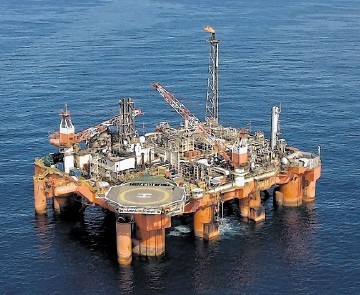
Aberdeen’s oil sector has been handed a major jobs boost with the announcement yesterday of 200 new posts.
The oil arm of shipping giant Maersk delivered a huge vote of confidence in the Granite City with word that it aims to double its production from the North Sea in the next five to six years.
The boost brings the number of jobs created by the firm recently to nearly 450 as it has taken on 240 people since the start of 2011.
The announcement came on the day David Cameron revealed his vision of using the North Sea to drive a “second energy revolution”. The
prime minister said 20 leading energy firms had signed up to work with the UK Government to co-ordinate investment in North Sea-based renewables schemes.
As well as the new jobs at Maersk, posts were also announced yesterday at north-east firm Survival Craft Inspectorate, which provides emergency marine evacuation systems.
| Energy jobs in Scotland on the up |
|---|
|
More than 440,000 jobs across the UK are supported by the oil and gas industry and the figure is expected to grow.
It is estimated that about 43% of the jobs in the sector are in Scotland. Industry skills body Opito estimated that 10,000 more people will be needed within four or five years to meet projected growth. Optimism in the oil and gas sector has been rising following the 2012 Budget, in which Chancellor George Osborne announced measures including tax breaks on certain types of oil and gas fields. According to industry body Oil and Gas UK’s 2012 Activity Survey, spending in the North Sea is expected to rise from £8.5billion in 2011 to £11.5billion in 2012. Aberdeen was the only major city in the UK to expand its economy during the recession, outperforming both London and Edinburgh, said another recent report. |
It is creating 22 jobs, 10 to be based at its Findon site, which employs 90 of its 140 total staff. The rest will be based overseas. The positions were created on the back of increased demand for lifeboat release and retrieval systems – due to new safety regulations – and this is set to help the firm boost turnover from £15million to £25million in the next financial year.
Maersk Oil’s UK managing director, Martin Rune Pedersen, said the Granite City was a core area for the oil firm.
“Aberdeen, in its role as gatekeeper to the UK North Sea, attracts and produces some of the world’s most proficient operatives in the oil and gas sector,” he said. “Oil and gas activity will continue to be a driving factor for Aberdeen’s economy for several decades and, with long-term confidence in the future of offshore operations, the city continues to be acknowledged as the energy capital of Europe.
“Having a business hub at the heart of one of the most important oil and gas-producing regions in the world is core to Maersk Oil and the company is extremely committed to growing and developing this important arm of the business.”
Mr Pedersen said Maersk Oil UK planned to spend £1billion a year in the North Sea and increase its onshore and offshore staff of 1,000 by 200 in the next two years.
It also aimed to double its daily production of 40,000 barrels of oil equivalent in the next five to six years, said Martin Rune Pedersen, managing director of Maersk Oil North Sea UK. .
This will be achieved through maximising recovery of oil and extending field lives, progressing fields to development and taking part in the 27th licensing round.
The firm, a subsidiary of Danish shipping firm AP Moller – Maersk Group, will also be looking at acquisition opportunities, Mr Pedersen said.
“We are screening opportunities in the market, but we are not desperate,” he said.
The firm currently employs 1,000 on and offshore, based out of Aberdeen, and has production of about 40,000 barrels of oil equivalent per day.
It entered the North Sea in 2005 when it bought the North Sea assets of Kerr McGee, taking over about 500 staff.
Mr Pedersen, who spoke at a Scottish Council for Development and Industry dinner on Wednesday night, also welcomed measures made in UK Government Chancellor George Osborne’s Budget last month.
He said: “The extension to the system of field allowances, commitments meeting the costs of decommissioning and the new field allowance allow businesses like Maersk Oil to feel comfort in our operational investments and enable us to cement our commitments to the UK oil and gas industry, Scotland and Aberdeen even further.
“Having a business hub at the heart of one of the most important oil and gas producing regions in the world is core to Maersk Oil, and the company is extremely committed to growing and developing this important arm of the business.
“The business is actively looking to invest in the region of $1.5bn per annum (nearly £1billion) within its North Sea operations and is even looking to expand its office capacity by a third over the next couple of years; an increase of around 200 new employees.”
Mr Pedersen added that the firm, a subsidiary of Danish shipping firm AP Moller Maersk Group, would be looking to hire local people as part of its expansion at its Altens site.
It has three main hubs – Gryphon, GPIII/Dunbarton and Janice – with ownership in 14 oil and gas fields.
Maersk is also gearing up to take a number of discoveries to development, including Culzean and Flyndre, he said.
The firm is also a partner in Nexen’s £2billion Golden Eagle development.
The Gryphon floating production vessel, which was damaged in a storm in February last year, is due back on station and producing at the end of summer, said Mr Pedersen.
Recommended for you
